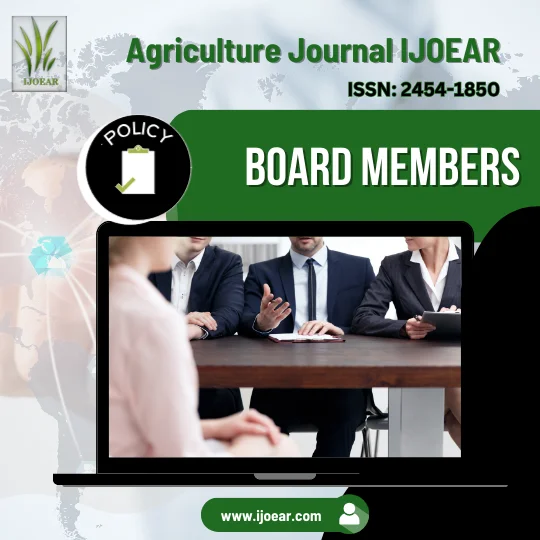 November 2025 Articles
November 2025 Articles Impact Factor: 6.69
Impact Factor: 6.69  Submit Article
Submit Article 
|
Citation Indices
|
All
|
Since 2020
|
|
Citation
|
6164
|
5117
|
|
h-index
|
31
|
29
|
|
i10-index
|
201
|
165
|
|
Acceptance Rate (By Year)
|
|
|
Year
|
Percentage
|
|
2024
|
11.09%
|
|
2023
|
15.23%
|
|
2022
|
12.81%
|
|
2021
|
10.45%
|
|
2020
|
9.6%
|
|
2019
|
14.3%
|
|
2018
|
17.65%
|
|
2017
|
16.9%
|
|
2016
|
22.9%
|
|
2015
|
26.1%
|

The International Journal of Environmental and Agriculture Research (IJOEAR), ISSN 2454-1850 (online), is a globally recognized peer-reviewed journal that publishes high-quality research in agriculture and environmental sciences. As part of its commitment to excellence, IJOEAR has established three distinct categories of board members: Advisory Board, Editorial Board, and Reviewer Board. Each category has unique roles, responsibilities, and selection criteria, ensuring the journal maintains its reputation for integrity, quality, and scientific rigor.
This page outlines the policies, qualifications, and responsibilities for each category of board members and serves as a guide for aspiring members.
The Advisory Board consists of senior experts and thought leaders in agriculture and environmental sciences. Their primary role is to provide strategic guidance to the journal, ensuring it aligns with emerging trends and maintains its relevance in the global research community.
The Editorial Board is responsible for managing the journal's content, ensuring that published articles meet the highest academic standards. Members of this board oversee the peer-review process and make key decisions on manuscript acceptance.
The Reviewer Board is composed of experts who assess the quality and relevance of submitted manuscripts. Reviewers ensure that only original, high-quality research is published in the journal.
IJOEAR follows a transparent and rigorous process for selecting board members across all three categories:
All board members, regardless of their category, are expected to uphold the following principles:
Yes, candidates with relevant qualifications and experience may apply for multiple categories, provided they meet the specific criteria for each.
While the positions are primarily honorary, board members receive recognition and acknowledgment for their contributions, including certificates of appreciation.
Tenure typically ranges from 2 to 3 years, with the possibility of renewal based on performance and mutual agreement.
Yes, early-career researchers with a Master’s degree and relevant expertise are encouraged to apply for the Reviewer Board.
The workload varies depending on the category. Reviewer Board members are expected to review 2-4 manuscripts per month, while Editorial Board and Advisory Board members may have additional responsibilities.
IJOEAR’s three-tiered structure of Advisory, Editorial, and Reviewer Boards ensures a comprehensive and collaborative approach to maintaining the journal's high standards. Whether you are an established expert, an experienced editor, or an aspiring reviewer, joining one of these boards offers an opportunity to contribute meaningfully to the advancement of scientific research. If you meet the criteria and are passionate about promoting high-quality research, consider applying to become a part of IJOEAR’s vibrant academic community.
For any queries or additional information, authors can contact the editorial team via email at info.ijoear@gmail.com or info @ijoear.com.com .